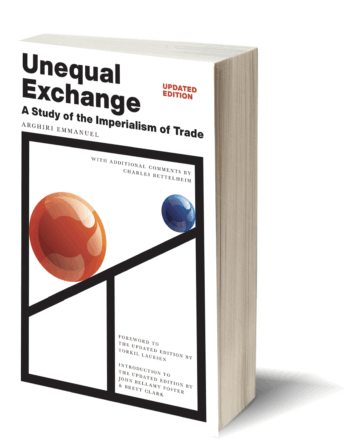January 1, 2026
In this Introduction to the updated edition of
Unequal Exchange by Arghiri Emmanuel, published by Monthly Review Press, John Bellamy Foster and Brett Clark offer readers insight into the continuing influence of Emmanuel's seminal work. Through both deep understanding thoughtful critique, the authors deftly situate Emmanuel's text as an indispensable part of an enduring tradition of Marxist analysis of the global dynamics of labor.
November 1, 2025
In a follow-up to their May 2024 article about the IMF'S vise-grip on Argentina's economy, David Barkin and Juan E. Santarcàngelo examine how recent events continue to shape the efforts of the global and domestic ruling classes to dominate Argentine society through debt, currency scams, and political malfeasance. Underlying all of this, they note, is the continued encroachment of the IMF on Argentina's sovereignty, aided and abetted by the far-right president Javier Milei.
October 1, 2025
Michael Meeropol, Howard J. Sherman, and Paul D. Sherman give an account of how mainstream economists came to adopt the idea of secular stagnation, even without recognizing its origins in the work of Marxist economist and
MR founder Paul M. Sweezy. The turn, they write, came in the wake of the Great Recession, when the tendency toward stagnation in the U.S. economy became undeniable.
September 1, 2025
"Assume a ship under the command of a mad captain headed for certain shipwreck. What would freedom mean to the people on board?" asked
MR cofounder Paul M. Sweezy in this previously unpublished discussion piece. "There can hardly be any doubt about the answer…the essence of freedom for the people on the ship is the ability to control their
collective fate."
July 1, 2025
Brian M. Napoletano revisits the concept of generalized autogestion, traditionally defined broadly as "self-management," placing it in the context of an ecological path to socialism. Using this orientation, Napoletano leads to reader to consider the potential of socioecological approaches to repairing the metabolic rift and pursuing sustainable human development.
April 1, 2025
This month,
MR editors take on the Sveriges Riksbank Prize in Economic Sciences in Memory of Alfred Nobel, a pale imitation of the five authentic Nobel Prizes that is aimed at reinforcing the ideology of neoclassical economics and awarded to mainstream liberal economists who defend the institutions of capitalism. In line with this tradition, the editors note, the most recent winners are keen apologists for settler colonialism and Zionism.
February 1, 2025
Since the 1980s, writes Lu Xinyu, a division between industrial and agricultural labor has grown in China, reflected in the fractured relationship between urban and rural areas. China's successful navigation of the issue, Lu concludes, relies on creating a vigorous alliance between the rural peasantry and urban workers that aids in the ultimate delinking of China from the imperialist, world system. Chinese-style modernization, Lu concludes, represents a path that, while developed in a Chinese context, "represents the aspirations of the Global South to break free from worldwide Western hegemony."
June 1, 2024
In this month’s “Notes from the Editors,” MR editors confront the Tower of Babel that has emerged over Marx’s early “Prometheanism” and later “degrowth communism.” This ahistorical interpretation has engendered further critique of ecosocialism and degrowth on the part of self-identified productivist writers, who attempt incorrectly to paint degrowth as a Malthusian project, rather than a realistic effort to live within Earth’s planetary capacities.
June 1, 2024
Originally published in the German journal Widerspruch, Arman Spéth interviews John Bellamy Foster about the growing interest in degrowth thought and the importance of incorporating democratic planning aimed at true equality into all levels of society. And what of the ecosocialist revolution? "Opportunities," Foster says, "are everywhere. Obstacles, largely a product of the present system, are also everywhere.… Nothing can or will remain the same. That is the very definition of a revolutionary situation."
April 1, 2024
As populations worldwide grow older, politicians are clamoring to raise the retirement age, thus extending people's working lives at their own expense. Using the lens of political economy, Cai Chao examines the false narratives behind capitalists' claims that delayed retirement is necessary to maintain society's productive capacity, and proposes solutions to promote human development at all life stages.










